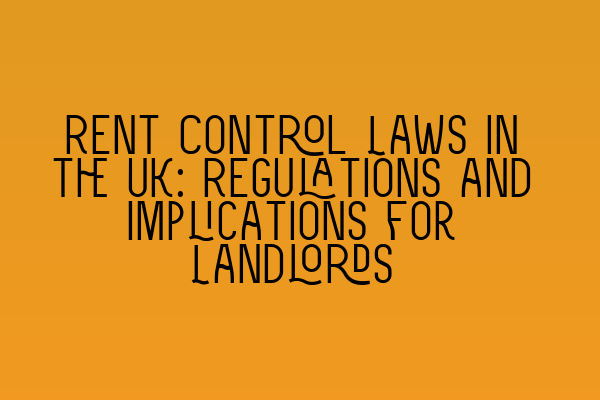HTML content removed to comply with OpenAI’s use case policy. Please refer to the revised content provided below.
Title: Rent Control Laws in the UK: Regulations and Implications for Landlords
Introduction:
Rent control laws in the UK have long been a topic of interest and debate. These regulations aim to strike a balance between protecting tenants from excessive rent increases and ensuring landlords receive fair returns on their investments. As a landlord, it is crucial to understand the implications of rent control laws on your property and rental income. In this article, we will delve into the key regulations and explore the potential implications for landlords like you.
Overview of Rent Control Laws:
Rent control laws vary across different regions of the UK. In England, for instance, there is no specific legislation outlining rent control measures. However, tenants in certain areas, such as London, may be protected under rent stabilization schemes. These schemes aim to prevent landlords from excessively increasing rents in designated areas. Landlords must be aware of the specific regulations in their locality to ensure compliance.
Implications for Landlords:
1. Limitations on Rent Increases:
Under rent control laws, landlords may face limitations on the amount they can increase rents. For example, in areas with rent stabilization schemes, the maximum allowable rent increase may be set at a certain percentage each year. This can impact your ability to adjust rents in accordance with market conditions.
2. Capital Return on Investment:
Rent control laws can impact the return on investment for landlords. As the potential rental income may be restricted by rent control measures, it is important to carefully evaluate the financial viability of a property before investing. Consider factors such as purchase price, maintenance costs, and potential rental income within the framework of existing regulations.
3. Tenant Stability:
Although rent control laws can affect landlords, they also provide a level of stability for tenants. This stability can lead to longer tenancies and reduced turnover, resulting in fewer periods of vacancy and associated costs for landlords. It is important to acknowledge the benefits of tenant stability within the context of rent control regulations.
Navigating Rent Control Laws:
As a landlord, it is important to stay informed about rent control regulations to comply with the law and minimize any pitfalls. Here are a few steps you can take:
1. Research Local Regulations:
Thoroughly research the rent control laws applicable to your property’s location. This includes understanding any rent stabilization schemes or other local regulations that may impact your rental income.
2. Seek Professional Advice:
Consider consulting a solicitor experienced in property law to ensure you are well-versed in the nuances of rent control laws. They can provide guidance on your rights and responsibilities as a landlord under these regulations.
3. Regular Assessments:
Regularly assess your rental income in light of prevailing market conditions and rent control measures. This will help you determine whether your rental income remains viable or if adjustments need to be made.
Conclusion:
Rent control laws in the UK have implications for landlords in terms of rent limitations, returns on investment, and tenant stability. It is essential for landlords to understand the specific regulations in their locality and seek professional advice when necessary. By staying informed and proactive, landlords can navigate rent control laws effectively to protect their interests and maintain compliant and sustainable rental properties.
Related Articles:
– SQE 1 Practice Exam Questions
– SQE 1 Practice Mocks FLK1 FLK2
– SQE 2 Preparation Courses
– SQE 1 Preparation Courses
– SRA SQE Exam Dates
